同位语从句、定语从句辨析
同位语从句和定语从句的区别是什么 如何区分

同位语从句和定语从句的区别是什么如何区分定语从句对先行词起修饰限定作用,有主次关系,先行词可为任何名词.同位语从句和前面的名词是并列关系,前面的名词一般包含着内容,如NEWS.定语从句引导词在从句中充当某种句子成分,同位语从句引导词在从句中不担当任何成分.同位语从句和定语从句的区别1同位语从句和定语从句的区别一,作用不同:同位语从句是解释说明名词的具体内容。
定语从句没有说明名词的具体内容,而是修饰某个名词或者代词。
二,可用同位语从句说明的名词大多数是抽象名词,主要有news , idea, fact, belief, question, truth, word(消息), doubt, evidence,order(命令)。
而定语从句所修饰的词既可以是抽象名词,也可以是具体的名词。
既可以是名词,也可以是those,anything,anybody,all这样的代词。
三,从句引导词不同:一般情况下,引导同位语从句的词主要是that。
当名词是question或者problem的特殊情况下,用于提问的疑问词一般都可以用在同位语从句中。
这包括:which, who, where, when, what , why等疑问词。
而定语从句中,一般情况下,that,which ,who,where ,where,why ,how等都可以引导定语从句。
2如何区分同位语从句和定语从句如果名词后的that从句是完整的,就是同位语从句;如果从句缺少主语或宾语,就是定语从句。
That从句在所有名词性从句中,都只是连接主从句的连词,没有任何意义,不在从句中充当句子成分;That从句在定语从句中是关系代词,不但连接主从句,还要指代被修饰的名词和代词(即先行词)在从句中做主语或宾语,也就是说定语从句中必定少个主语或宾语!。
定语从句和同位语从句解析

定语从句和同位语从句解析定语从句和同位语从句是英语语法中常见的两种从句结构。
它们在句子中分别用来修饰名词或解释说明某个名词所代表的意思。
在本文中,我们将对定语从句和同位语从句进行详细解析。
一、定语从句1. 定义定语从句是用来修饰名词或代词的从句,起到对名词进行进一步说明或解释的作用。
2. 用法定语从句通常由关系代词或关系副词引导,关系代词包括that, which, who, whom, whose等,关系副词包括where, when, why等。
3. 关系代词的用法区别:(1)that: 可用来修饰人或物,引导的定语从句在句中位置较灵活,可置于先行词之后或之前。
(2)which: 只能用来修饰物,引导的定语从句一般放在先行词之后。
(3)who/whom: 只能用来修饰人,who作主语,whom作宾语。
(4)whose: 用来修饰人或物,表示所属关系。
4. 例句:(1)I have a friend who/that lives in New York.(我有一个住在纽约的朋友。
)(2)The book, which is on the table, belongs to me.(那本放在桌子上的书是我的。
)(3)This is the place where we met last year.(这是我们去年见面的地方。
)(4)He is the man whose car was stolen.(他就是那个车被偷的男人。
)二、同位语从句1. 定义同位语从句是用来解释说明名词或代词所表达的意思的从句,起到对名词进行进一步概括和说明的作用。
2. 用法同位语从句通常由that引导,用来解释说明或补充名词的具体信息。
3. 例句:(1)The fact that he cheated in the exam surprised everyone.(他在考试中作弊这个事实让每个人都感到惊讶。
)(2)Her hope is that she can go abroad to study.(她的愿望就是能够出国留学。
辨析同位语从句与定语从句
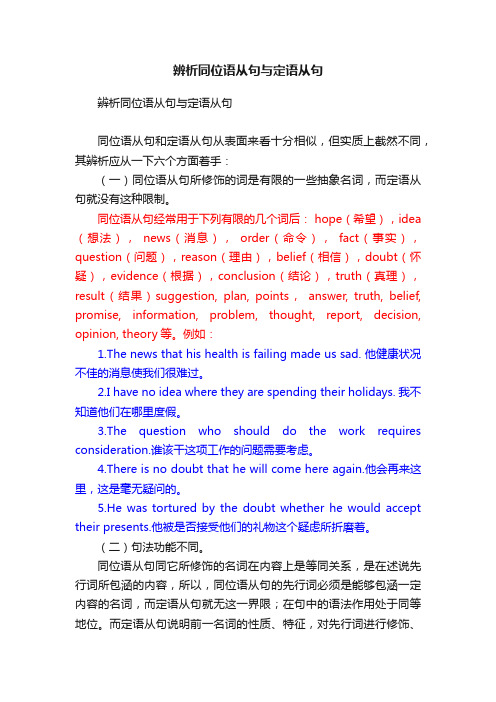
辨析同位语从句与定语从句辨析同位语从句与定语从句同位语从句和定语从句从表面来看十分相似,但实质上截然不同,其辨析应从一下六个方面着手:(一)同位语从句所修饰的词是有限的一些抽象名词,而定语从句就没有这种限制。
同位语从句经常用于下列有限的几个词后: hope(希望),idea (想法),news(消息),order(命令),fact(事实),question(问题),reason(理由),belief(相信),doubt(怀疑),evidence(根据),conclusion(结论),truth(真理),result(结果)suggestion, plan, points,answer, truth, belief, promise, information, problem, thought, report, decision, opinion, theory等。
例如:1.The news that his health is failing made us sad. 他健康状况不佳的消息使我们很难过。
2.I have no idea where they are spending their holidays. 我不知道他们在哪里度假。
3.The question who should do the work requires consideration.谁该干这项工作的问题需要考虑。
4.There is no doubt that he will come here again.他会再来这里,这是毫无疑问的。
5.He was tortured by the doubt whether he would accept their presents.他被是否接受他们的礼物这个疑虑所折磨着。
(二)句法功能不同。
同位语从句同它所修饰的名词在内容上是等同关系,是在述说先行词所包涵的内容,所以,同位语从句的先行词必须是能够包涵一定内容的名词,而定语从句就无这一界限;在句中的语法作用处于同等地位。
定语从句与同位语从句的比较
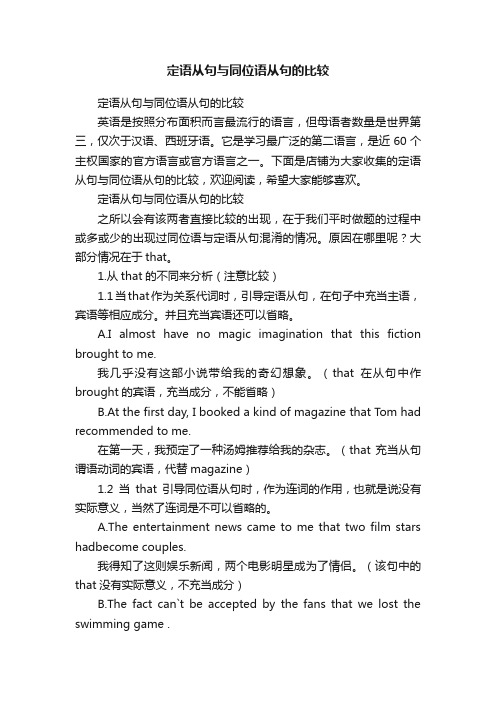
定语从句与同位语从句的比较定语从句与同位语从句的比较英语是按照分布面积而言最流行的语言,但母语者数量是世界第三,仅次于汉语、西班牙语。
它是学习最广泛的第二语言,是近60个主权国家的官方语言或官方语言之一。
下面是店铺为大家收集的定语从句与同位语从句的比较,欢迎阅读,希望大家能够喜欢。
定语从句与同位语从句的比较之所以会有该两者直接比较的出现,在于我们平时做题的过程中或多或少的出现过同位语与定语从句混淆的情况。
原因在哪里呢?大部分情况在于that。
1.从that的不同来分析(注意比较)1.1当that作为关系代词时,引导定语从句,在句子中充当主语,宾语等相应成分。
并且充当宾语还可以省略。
A.I almost have no magic imagination that this fiction brought to me.我几乎没有这部小说带给我的奇幻想象。
(that在从句中作brought的宾语,充当成分,不能省略)B.At the first day, I booked a kind of magazine that Tom had recommended to me.在第一天,我预定了一种汤姆推荐给我的杂志。
(that 充当从句谓语动词的宾语,代替magazine)1.2当that引导同位语从句时,作为连词的作用,也就是说没有实际意义,当然了连词是不可以省略的。
A.The entertainment news came to me that two film stars hadbecome couples.我得知了这则娱乐新闻,两个电影明星成为了情侣。
(该句中的that没有实际意义,不充当成分)B.The fact can`t be accepted by the fans that we lost the swimming game .这个事实不能被粉丝所接受,我们输掉了游泳比赛。
(that作为连词)2.根据一些名词来判断A.The information that he will come back home is surprising.他要回家的消息是令人惊讶的.(information这类词)B.I got an idea that you were no there.我察觉到了你没有在那儿。
同位语从句和定语从句区别
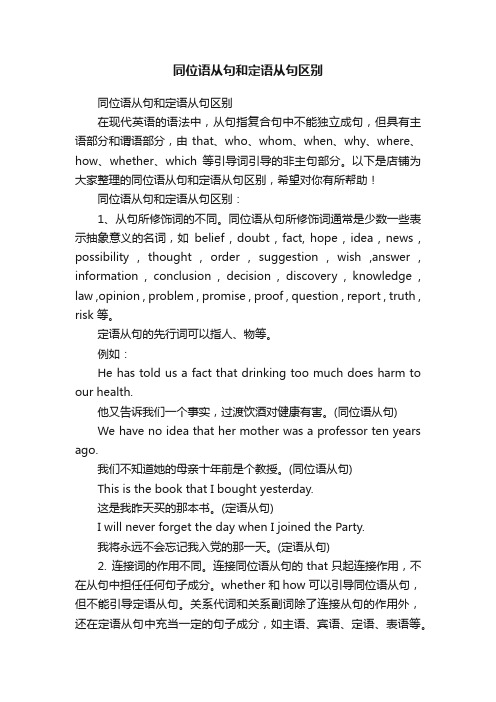
同位语从句和定语从句区别同位语从句和定语从句区别在现代英语的语法中,从句指复合句中不能独立成句,但具有主语部分和谓语部分,由that、who、whom、when、why、where、how、whether、which等引导词引导的非主句部分。
以下是店铺为大家整理的同位语从句和定语从句区别,希望对你有所帮助!同位语从句和定语从句区别:1、从句所修饰词的不同。
同位语从句所修饰词通常是少数一些表示抽象意义的名词,如belief , doubt , fact, hope , idea , news , possibility , thought , order , suggestion , wish ,answer , information , conclusion , decision , discovery , knowledge , law ,opinion , problem , promise , proof , question , report , truth , risk 等。
定语从句的先行词可以指人、物等。
例如:He has told us a fact that drinking too much does harm to our health.他又告诉我们一个事实,过渡饮酒对健康有害。
(同位语从句)We have no idea that her mother was a professor ten years ago.我们不知道她的母亲十年前是个教授。
(同位语从句)This is the book that I bought yesterday.这是我昨天买的那本书。
(定语从句)I will never forget the day when I joined the Party.我将永远不会忘记我入党的那一天。
(定语从句)2. 连接词的作用不同。
连接同位语从句的that只起连接作用,不在从句中担任任何句子成分。
同位语从句与定语从句区别

同位语从句与定语从句区别同位语从句与定语从句区别在现代英语的语法中,从句指复合句中不能独立成句,但具有主语部分和谓语部分,由that、who、whom、when、why、where、how、whether、which等引导词(Connective)引导的非主句部分。
下面是店铺为大家整理的同位语从句与定语从句区别,欢迎大家借鉴与参考,希望对大家有所帮助。
同位语从句与定语从句的区别定语从句与同位语从句在形式以及它们在句中的位置上都很相似,但它们在句中的句法-功能不同,所用的引导词也不完全一样。
1. 定语从句是形容词从句,其句法-功能相当于一个形容词,与前面的名词是修饰与被修饰关系,即限定它前面的名词范围,或补充一些情况;而同位语从句是名词性从句,其作用相当于一个名词,与前面的名词是同位关系,是对前面的名词作进一步解释,即说明它前面名词的内容。
如:The news that he told me just now is true.他刚才告诉我的消息是真的。
(定语从句)The news that I have passed the exam is true.我通过了考试这一消息是真的。
(同位语从句)2. 同位语从句与其所修饰的名词之间是一种同位关系,二者之间存在逻辑上的系表关系,可用“主 + 系 + 表”结构来表示,而定语从句则没有这种关系。
如:The news that he won the first place is true.他赢得冠军的消息是真的。
(同位语从句)若用“主 + 系 + 表”结构来表示,则是:The news is that he won the first place.那个消息是他赢得了冠军。
3. 定语从句的先行词可以是各类名词,而可跟同位语从句的名词通常只是news,idea,fact,promise,question,doubt,thought,hope,message,suggestion,possibility 等少数几个。
定语从句与同位语从句的区别

定语从句与同位语从句的区别定语从句和同位语从句都是从句的一种类型,它们在句子中起到不同的语法作用。
本文将详细介绍定语从句和同位语从句的区别。
1. 定语从句定语从句用来修饰一个名词,并且在句子中作为这个名词的定语。
它通常用于对名词进行描述、限定或者补充说明。
定语从句的特点是:- 定语从句通常使用关系代词或关系副词引导,如that, which, who, whom, whose, when, where等。
- 定语从句紧跟在名词后面,与名词之间用逗号或者引号分隔。
- 定语从句中的谓语动词通常要有主语,这个主语就是引导词在从句中所指代的名词。
以下是一些定语从句的例子:- The book that I bought yesterday is very interesting.(我昨天买的那本书非常有趣。
)- The woman who is sitting next to me is my sister.(坐在我旁边的那个女人是我的姐姐。
)2. 同位语从句同位语从句用来说明名词,进一步解释或者补充名词的具体内容。
同位语从句通常由"是"、"为"、"包括"等引导语词引导。
同位语从句的特点是:- 同位语从句通常使用“that”引导,也可以使用“whether”或者“if”引导。
- 同位语从句与其所说明的名词之间用逗号或者引号分隔。
- 同位语从句中的谓语动词通常要有主语,这个主语就是从句中所表示的具体内容。
以下是一些同位语从句的例子:- The fact that he passed the exam made his parents proud.(他通过了考试这个事实让他的父母感到骄傲。
)- I'm not sure whether she will come to the party.(我不确定她是否会来参加派对。
)3. 虽然定语从句和同位语从句在形式上有一些相似之处,但它们在语法功能和用法上有明显的区别。
英语语法同位语从句与定语从句的区别

英语语法同位语从句与定语从句的区别英语语法是针对英语语言进行研究后,系统地总结归纳出来的一系列语言规则。
下面店铺为大家带来英语语法同位语从句与定语从句的区别,希望大家喜欢!英语语法同位语从句与定语从句的区别篇1同位语从句与定语从句形相似而实质不同,具体表现在以下几个方面:(1)被修饰的词不同。
同位语从句的前面一般是数量有限的、表示抽象意义的名词;而定语从句的先行词是无数的指人或物名词。
(2)从句的作用不同。
同位语从句表示同位名词的具体内容;而定语从句是对先行词—名词的限制、描绘或说明。
(3)引导词的作用不同。
引导同位语从句的that是连词,在从句中不担任任何成分,但不能省略;而引导定语从句的that为关系代词,在从句中担任句子的某种成分,当担任定语从句中的宾语时,that可以省略。
(4)引导词不同。
定语从句不能用what,how,whether引导;而同位从句可以用what,how,whether引导(5)判定定语从句和同位语从句的方法。
同位语从句可充当同位名词的表语;而定语从句不能充当先行词的.表语。
英语语法同位语从句与定语从句的区别篇2同位语从句与定语从句的区别(1)定语从句修饰限定先行词,它与先行词是修饰关系;同位语从句解释说明先行词的具体内容,它与先行词是同位关系。
①The planethat has just taken offis for Paris. (定语从句)②The factthat he has diedis quite clear. (同位语从句)(2)定语从句由关系代词或关系副词引导,关系词在从句中担当相应的句子成分,关系代词在从句中作宾语时经常可省略。
同位语从句主要由连词that 引导,在从句中不充当句子成分;where, when, how, who, whether, what 等连词也可以引导同位语从句,这些连词则在从句中担当成分。
①The newsthat he told meis true. (定语从句)②The newsthat he has just diedis true. (同位语从句)③The problemthat we’re facing nowis how we can collect so much money. (定语从句)④The problemhow we can collect so much moneyis hard to solve. (同位语从句)⑤The questionthat he raisedpuzzled all of us. (定语从句)⑥The questionwhether he is sure to win the gameis hard to answer.(同位语从句)(3)同位语从句与先行词一般可以用be动词发展成一个完整的句子, 而定语从句则不能。
同位语从句与定语从句的区别

同位语从句与定语从句的区别1.性质不同同位语从句和主语从句、表语从句、宾语从句同属于名词性从句,表示与之同位的名词(短语)的实际内容,它的作用相当于名词,对前面的名词(短语)加以补充说明或进一步解释。
定语从句是由关系代词或关系副词引导的从句,其作用是作定语修饰主句的某个名词性成分,相当于形容词,所以又称为形容词性从句,一般跟在它所修饰的先行词后面。
2.引导词不同同位语从句的引导词多是that,whether,也有连接代词what,who,连接副词how, when, where等。
切记,if, which 不能引导同位语从句。
引导词在句中不充当任何成分。
定语从句的引导词有关系代词that, which, who, whom, whose, as等(没有what),关系副词where, when, why等。
引导词有连接定语从句、代替主句中的先行词,甚至可能是主句中的一部分或者整个主句及在定语从句中充当句子成分等作用。
3.先行词不同同位语从句所修饰的名词比较有限,通常是抽象名词,有一定的内涵。
常见的有idea, situation thought, fact, evidence, belief, doubt, fear, hope, question, theory, suggestion, proposal, word, thought, truth, possibility, promise, order,news, order, ability等等。
定语从句所修饰的名词则非常广泛,可以是名词、代词、主句的一部分甚至整个句子。:4.位置区别一般情况下同位语从句跟在先行词后,用以说明该名词所表达的具体内容;有时同位语从句可以不紧跟在它所说明的名词后,而被别的词语隔开,在语法上叫做分隔式同位语从句。
定语从句一般跟在它所修饰的先行词后面,有限定性和非限定性之分。
定语从句与同位语从句的区别及用法解析

定语从句与同位语从句的区别及用法解析定语从句和同位语从句是英语语法中两个常见的从句类型。
虽然它们在句子中都表达了一个附加的信息,但在用法和功能上有所区别。
本文将对定语从句和同位语从句的区别进行解析,并详细介绍它们的用法。
一、定语从句的定义和用法定语从句是用来修饰先行词的从句,它可以用来进一步描述先行词的性质、特征或者限定先行词的范围。
定语从句通常由关系代词(who, whom, whose, which, that)或关系副词(where, when, why)引导。
例如:1. This is the book that I bought yesterday.这是我昨天买的书。
2. The girl who is standing over there is my sister.那个站在那边的女孩是我的妹妹。
在这两个例句中,定语从句分别通过关系代词"that"和"who"引导,并修饰了先行词"book"和"girl"。
定语从句的引导词在从句中充当句子成分,具有主语、宾语或定语的作用。
二、同位语从句的定义和用法同位语从句是用来解释、补充或说明名词的从句,它对名词进行进一步的解释或具体化。
同位语从句通常由连词"that"引导。
例如:1. His belief is that everyone should be treated equally.他的信念是每个人应该受到平等对待。
2. The fact that he lied surprised me.他撒谎的事实让我感到惊讶。
在这两个例句中,同位语从句分别通过连词"that"引导,并对名词"belief"和"fact"进行进一步的解释。
同位语从句与先行词的关系更加密切,它通常承担某种解释或说明的功能。
如何区别定语从句与同位语从句
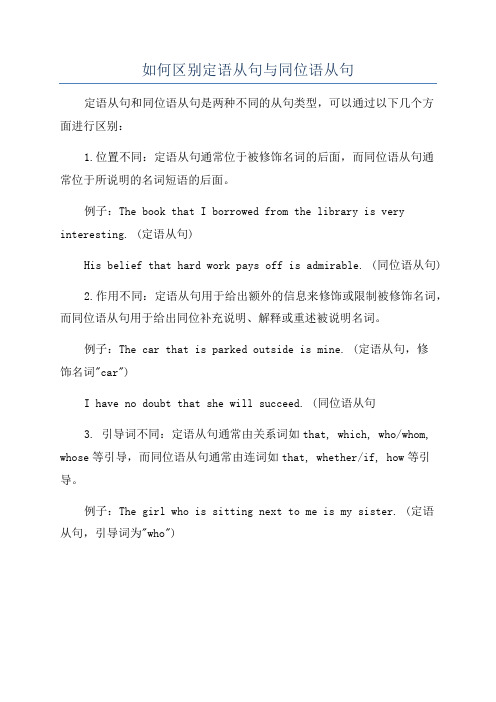
如何区别定语从句与同位语从句
定语从句和同位语从句是两种不同的从句类型,可以通过以下几个方
面进行区别:
1.位置不同:定语从句通常位于被修饰名词的后面,而同位语从句通
常位于所说明的名词短语的后面。
例子:The book that I borrowed from the library is very interesting. (定语从句)
His belief that hard work pays off is admirable. (同位语从句)
2.作用不同:定语从句用于给出额外的信息来修饰或限制被修饰名词,而同位语从句用于给出同位补充说明、解释或重述被说明名词。
例子:The car that is parked outside is mine. (定语从句,修
饰名词"car")
I have no doubt that she will succeed. (同位语从句
3. 引导词不同:定语从句通常由关系词如that, which, who/whom, whose等引导,而同位语从句通常由连词如that, whether/if, how等引导。
例子:The girl who is sitting next to me is my sister. (定语
从句,引导词为"who")。
同位语从句与定语从句的用法区别

同位语从句与定语从句的用法区别同位语从句和定语从句都是从句的一种形式,用于修饰名词或代词,但它们在用法上有着一些不同之处。
同位语从句和定语从句的用法区别主要体现在以下几个方面:一、位置不同同位语从句通常置于名词或代词之后,起到对名词或代词进行解释或说明的作用。
而定语从句通常置于被修饰名词之后,用来对名词进行进一步修饰。
二、作用不同1. 同位语从句:同位语从句通常用来对名词或代词进行解释或解说,并且在句中起到同位语的作用,说明或补充名词的具体内容。
例如:- 他的目标是,他能够学好英语。
- 我知道的是,他已经离开了这个城市。
在这些例句中,同位语从句分别对名词"目标"和"我知道的"进行解释,并且与之构成同位关系。
2. 定语从句:定语从句主要是对名词进行进一步的修饰,并且在句中充当定语的角色。
例如:- 我喜欢的那本书是我的朋友推荐的。
- 坐在那里的那个人是我的老师。
在这些例句中,定语从句分别对名词"书"和"那个人"进行进一步的修饰,起到补充说明的作用。
三、引导词不同1. 同位语从句:同位语从句通常由一些引导词来引导,常见的引导词有"是"、"就是"、"意思是"等。
例如:- 他的目标是,他能够学好英语。
- 我知道的是,他已经离开了这个城市。
在这些例句中,"是"和"知道的是"就是同位语从句的引导词。
2. 定语从句:定语从句则由关系词来引导,常见的关系词有"关系代词"如"who"、"which"、"that",还有"关系副词"如"when"、"where"、"why"等。
例如:- 我喜欢的那本书是我的朋友推荐的。
同位语从句与定语从句的区别
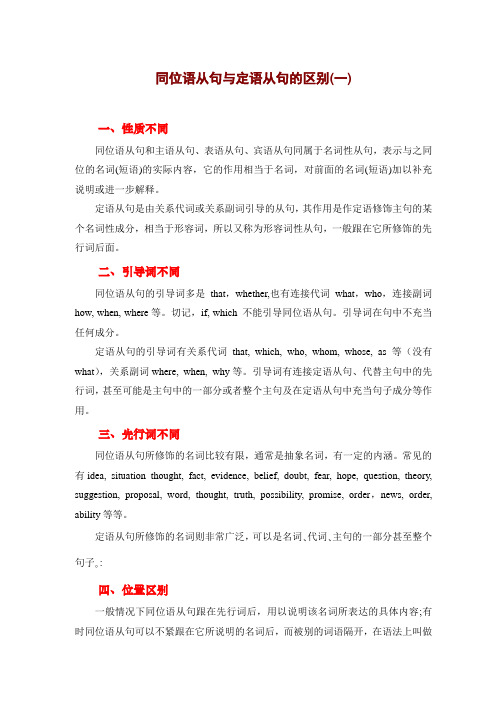
同位语从句与定语从句的区别(一)一、性质不同同位语从句和主语从句、表语从句、宾语从句同属于名词性从句,表示与之同位的名词(短语)的实际内容,它的作用相当于名词,对前面的名词(短语)加以补充说明或进一步解释。
定语从句是由关系代词或关系副词引导的从句,其作用是作定语修饰主句的某个名词性成分,相当于形容词,所以又称为形容词性从句,一般跟在它所修饰的先行词后面。
二、引导词不同同位语从句的引导词多是that,whether,也有连接代词what,who,连接副词how, when, where等。
切记,if, which 不能引导同位语从句。
引导词在句中不充当任何成分。
定语从句的引导词有关系代词that, which, who, whom, whose, as等(没有what),关系副词where, when, why等。
引导词有连接定语从句、代替主句中的先行词,甚至可能是主句中的一部分或者整个主句及在定语从句中充当句子成分等作用。
三、先行词不同同位语从句所修饰的名词比较有限,通常是抽象名词,有一定的内涵。
常见的有idea, situation thought, fact, evidence, belief, doubt, fear, hope, question, theory, suggestion, proposal, word, thought, truth, possibility, promise, order,news, order, ability等等。
定语从句所修饰的名词则非常广泛,可以是名词、代词、主句的一部分甚至整个句子。:四、位置区别一般情况下同位语从句跟在先行词后,用以说明该名词所表达的具体内容;有时同位语从句可以不紧跟在它所说明的名词后,而被别的词语隔开,在语法上叫做分隔式同位语从句。
定语从句一般跟在它所修饰的先行词后面,有限定性和非限定性之分。
同位语从句与定语从句的区别(二)同位语从句和定语从句一样通常都放在由名词充当的先行词后面, 且其先行词和关联词特点与定语从句先行词及关联词特点十分相似,极易混淆,不过两者的区别还是十分明显的。
同位语从句与定语从句有什么区别
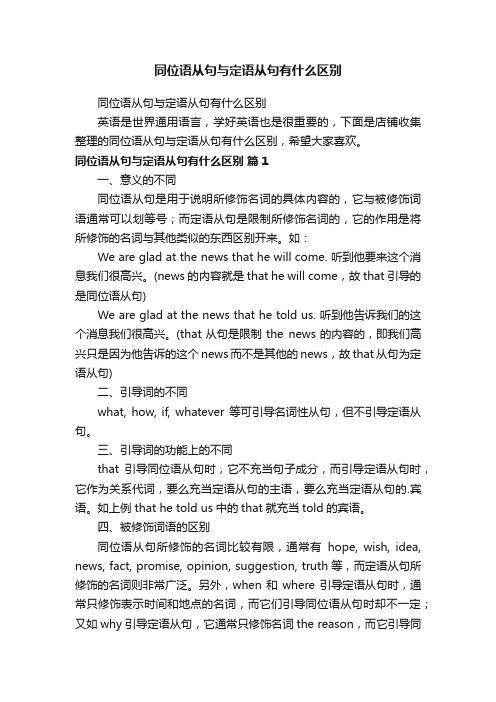
同位语从句与定语从句有什么区别同位语从句与定语从句有什么区别英语是世界通用语言,学好英语也是很重要的,下面是店铺收集整理的同位语从句与定语从句有什么区别,希望大家喜欢。
同位语从句与定语从句有什么区别篇1一、意义的不同同位语从句是用于说明所修饰名词的具体内容的,它与被修饰词语通常可以划等号;而定语从句是限制所修饰名词的,它的作用是将所修饰的名词与其他类似的东西区别开来。
如:We are glad at the news that he will come. 听到他要来这个消息我们很高兴。
(news的内容就是that he will come,故that引导的是同位语从句)We are glad at the news that he told us. 听到他告诉我们的这个消息我们很高兴。
(that从句是限制the news的内容的,即我们高兴只是因为他告诉的这个news而不是其他的news,故that从句为定语从句)二、引导词的不同what, how, if, whatever 等可引导名词性从句,但不引导定语从句。
三、引导词的功能上的不同that引导同位语从句时,它不充当句子成分,而引导定语从句时,它作为关系代词,要么充当定语从句的主语,要么充当定语从句的.宾语。
如上例 that he told us中的that就充当told的宾语。
四、被修饰词语的区别同位语从句所修饰的名词比较有限,通常有hope, wish, idea, news, fact, promise, opinion, suggestion, truth等,而定语从句所修饰的名词则非常广泛。
另外,when和where 引导定语从句时,通常只修饰表示时间和地点的名词,而它们引导同位语从句时却不一定;又如why引导定语从句,它通常只修饰名词the reason,而它引导同位语从句时则不一定。
如:I have no idea when they will come . 我不知道他们什么时候来。
同位语从句与定语从句的区别比较同位语从句与定语从句的语法结构与功能
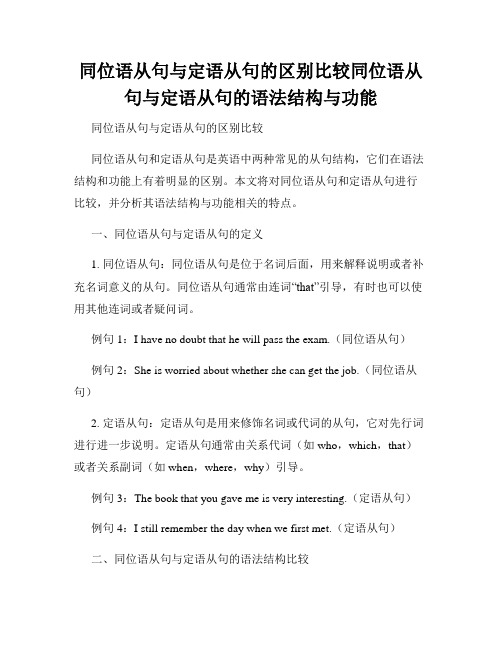
同位语从句与定语从句的区别比较同位语从句与定语从句的语法结构与功能同位语从句与定语从句的区别比较同位语从句和定语从句是英语中两种常见的从句结构,它们在语法结构和功能上有着明显的区别。
本文将对同位语从句和定语从句进行比较,并分析其语法结构与功能相关的特点。
一、同位语从句与定语从句的定义1. 同位语从句:同位语从句是位于名词后面,用来解释说明或者补充名词意义的从句。
同位语从句通常由连词“that”引导,有时也可以使用其他连词或者疑问词。
例句1:I have no doubt that he will pass the exam.(同位语从句)例句2:She is worried about whether she can get the job.(同位语从句)2. 定语从句:定语从句是用来修饰名词或代词的从句,它对先行词进行进一步说明。
定语从句通常由关系代词(如who,which,that)或者关系副词(如when,where,why)引导。
例句3:The book that you gave me is very interesting.(定语从句)例句4:I still remember the day when we first met.(定语从句)二、同位语从句与定语从句的语法结构比较1. 同位语从句的语法结构:主语 + 动词 + 同位语(从句)2. 定语从句的语法结构:先行词 + 关系代词/关系副词 + 谓语 + 其他成分三、同位语从句与定语从句的功能比较1. 同位语从句的功能:(1)同位语从句作为对名词进行解释和补充,起到进一步说明的作用。
例句5:I have a feeling that something bad is going to happen.(同位语从句)例句6:His hope is that he can study abroad next year.(同位语从句)(2)同位语从句可以用来表达说话人的观点、信念等,并引出对于主句的评价或者看法。
同位语从句和定语从句的区别主要有哪些不同

同位语从句和定语从句的区别主要有哪些不同同位语从句和定语从句的区别有作⽤不同、从句引导词不同、先⾏词在句中的作⽤不同、引导词作⽤不同等。
同位语从句和定语从句的区别同位语从句与定语从句形相似⽽实质不同,具体表现在以下⼏个⽅⾯:1)被修饰的词不同:同位语从句的前⾯⼀般是数量有限的、表⽰抽象意义的名词;⽽定语从句的先⾏词是数量⽆数的指⼈或物的普通意义名词。
2)先⾏词(同位语词)在从句的作⽤不同:同位语从句表⽰同位名词的具体内容,从句具有解释和说明先⾏词的作⽤,并且先⾏词在从句中不做任何成分;⽽定语从句是对先⾏词的限制、描绘或说明,先⾏词在从句中做⼀定的成分。
3)引导词不同:what, how, whether等不能⽤于引导定语从句,但可⽤于引导同位语从句。
4)引导词的作⽤不同:引导同位语从句的that是连词,在从句中不充当任何成分;⽽引导定语从句的that为关系代词,在从句中充当⼀定的句⼦成分。
5)判定定语从句和同位语从句的基本⽅法(或称⼟办法):由于同位语从句是⽤以说明和解释被修饰名词的具体内容的,所以它可以转换成同位名词的表语,构成我们所讲过的五种简单句中的 ”主系表结构”: 主语(先⾏词或称同位语词)+表语(同位语从句);⽽定语从句则不能做这种转换。
同位语从句和定语从句的例句1) The mistakethat he madehas cost great loss to the company.他犯的错误使公司损失惨重。
2) It's a great mistakethat he took the book without permission.他未经允许就拿⾛了那本书,这是⼀个很⼤的错误。
3)We have to do something about the factthat the city centre is overcrowded with vehicles.我们必须对市中⼼车辆拥挤的情况采取些措施。
怎样区分定语从句和同位语从句

考点剖析在英语表达中,定语作为无处不在的一个句子成分,不仅可以用形容词、名词、介词短语、非谓语动词充当,还可以用从句做定语,这就是我们常说的定语从句。
但在高中阶段还有一种同样可以接在名词后,同样是用来解释说明名词和代词的从句,便是同位语从句。
同位语从句和定语从句在某种意义上具有一定的相似性,这也是学生及其容易混淆的两种从句。
因此教师在教学时,要注意讲解定语从句和同位语从句的区分方法,从而让学生学会正确应用。
一般地,我们应该如何区分名词后面的从句到底是定语从句还是同位语从句呢?定语从句作为形容词性从句,在句子中作定语;而同位语从句和主语从句、宾语从句、表语从句相同,同属于名词性从句,在句子中充当的是同位语的角色。
我们到底应该如何区分这两种从句?首先我们可以从定义上区分:1.通常,定语从句用在名词或者代词后,用来限定名词的范围或描述名词的特征,在翻译时,通常会翻译为“……的”;而同位语从句大多在抽象名词后,用于补充说明抽象名词的具体内容,翻译时没有特定指示。
例句:The order that we received yesterday wasthat we should send a few people to help the othergroups.(定语从句)这里是that引导的是定语从句,用来修饰“the or-der”,翻译时我们需要将整句翻译为:我们昨天收到的命令是我们应该派几个人去帮助其他几个小组。
这里的that可以省略,若将同样的句意改写为同位语从句,应是:The order that we should send a few people to helpthe other groups was received yesterday.(同位语从句)这里的that引导的就是同位语从句,用来解释说明“the order”,that虽不作成分,但不可省略,且在翻译时无明显特指。
整句翻译为:我们应该派几个人去帮助其他小组的命令昨天收到了。
定语从句和同位语从句区别归纳

定语从句和同位语从句的差别【1 】一. 定语从句是形容词从句,其感化相当于一个形容词,是用来润饰前面的名词或代词的;同位语从句是名词从句,其感化相当于一个名词,是对前面的名词作进一步解释的.例如:1. We heard the news that he had told her. 我们听到他对她说的新闻.2. We heard the news that he had won the game. 我们听到新闻他博得了比赛.例1中的that从句的感化相当于一个形容词,其感化是润饰the news;例2中的that从句的感化相当于一个名词,是对the news的进一步解释.二.定语从句的引诱词在从句中充当必定的成分,可作主语.宾语.状语等;而同位语从句中的引诱词在从句只起衔接感化,不作任何句子成分.例如:1. A plane is a machine that can fly. 飞机是一种能飞的机械.2. The fact that they didn't finish the work has to be faced. 必须面临事实,他们没有完成工作.例1中的引诱词that在从句中充当句子成分,作从句的主语,故为定语从句;例2中的that只起衔接感化,引诱从句解释fact的内容,不作任何句子成分,故为同位语从句.引诱从句的联系关系词that的功效不合:that引诱同位语从句时是一个纯连词,不充当任何成分;而引诱定语从句的that是关系代词,既指代先行词又须在从句中充当成分.三.引诱定语从句的联系关系词在从句中作宾语或状语时,可以省略或被其他词代替;而同位语从句的引诱词一般不克不及省略,更不克不及被代替.例如:1. The news that she heard is true. 她听到的新闻是真的.2. The news that she will go abroad is true. 她将出国这新闻是真的.例1是定语从句,that可省略;例2是同位语从句,that不克不及省略.3. The reason why he was chosen remains unknown. 他为什么被选上的原因照样不清晰.4. The idea why he was chosen attracted our attention. 他为什么会被选上,这一设法主意引起我们的留意.例3中why引诱的是定语从句,why可以被 for which或 that 代替;例4中 why引诱的是同位语从句,why 不克不及省去,也不克不及被其它词代替.四.同位语从句与其所润饰的名词之间是一种同位关系,二者之间消失逻辑上的系表关系,可用“主+系+表”构造来暗示.例如:The news that he won the first place is true. 他博得冠军的谁人新闻是真的.上句若用“主+系+表”构造来暗示,则是:The news is that he won the first place. 新闻是他博得了冠军.意思合理,系表结构成立,故为同位语从句.五.定语从句所润饰.限制的先行词可所以各类名词,可以有复数情势;而同位语从句一般都与抽象名词同位,一般没有复数情势.例如:1. The possibilities that she was offered seemed very great.她得到的可能性似乎大些.2. Her mother was worried about the possibility that her daughter dislike to go to school. 她的母亲很放心,她女儿有可能不爱好上学.例1中的possibilities是定语从句的先行词,可用复数情势;例2中的possibility是抽象名词,后接的是同位语从句,一般不必复数情势.六.由when, why, where引诱的定语从句分离润饰或解释暗示时光.原因或地点的词,但它们引诱的同位语从句一般和气暗示时光或地点的词同位.例如:1. I still remember the day when I first came to Beijing. 我仍然记得初次来北京的那天.2. I have no idea when she will be back. 我不知道她何时回来.3. This is the house where I lived two years ago. 这是我两年前住的房子.4. The question where we shall have a meeting hasn't decided. 我们到什么地方去开会,这个问题没有决议.例1.3中的when和 where引诱的是定语从句,day 和house分离暗示时光和地点;例2.4中的when和 where引诱的是同位语从句.众所周知,定语从句与同位语从句是中学英语语法的一个主要构成部分,都由连词that和副词when,where,why来引诱,看似情势雷同,现实上有着本质的差别.起首.我们看界说,定语从句是在复合句中润饰名词或代词的从句,句法功效与形容词雷同,是形容词性从句.而同位语从句是在复合句中,用以解释或解释某些特命名词的从句,句法功效与名词雷同,故是名词性从句.其次,我们分离来看看雷同的引诱词不合的寄义:由that引诱的定法从句和同位语从句的差别:试比较(l)The plan (that) Mr.Lee drew up last week was very good.(李师长教师上周提的计划很好.)(2)The plan that we should build another lad building was very good.(我们应当再造一个试验楼的计划很好.)例(l)中,that引诱的从句限制了先行词plan的规模,说明是李师长教师提出的计划,而不是此外什么人,但并未解释计划的内容,that在从句中作宾语,是关系代词,故可以省略,是以,该从句是个定语从句.例(2)that引诱的从句说清晰明了计划的内容,that在从句中不担任任何成份,只起连词感化,但又不克不及省略,是个从属连词,是以,该从句是个同位语从句.(3)The news that Jack brought us pleased everybody.杰克给我们带来的新闻,使大家觉得愉快.(和上述例(1))相仿,that引诱定语从句.)(4) The news that our team had won pleased everybody.我们球队赢球这个新闻,使大家愉快(和例(2)相仿,that引诱同位语从句)由此,可以从以下几点加以差别:(1)从语法角度上看,引诱定语从句的that是关系代词,不单起衔接感化,还在从句中担任句子成分,可作主语,宾语或表语,而that引诱同位语从句时,只是从属连词,没有其实的词汇意义,在从句中不担任任何句子成分,即从同本身构造完全.(2)从语意角度上看,定语从句的感化是限制它的先行词的规模或填补一些情形,和它前面的名词是从属关系,暗示“……的”,起润饰感化;而同位语从句与前面的名词是同位关系,感化则是阐述前面名词的内容.3定语从句的关系代词that在从句中作宾语时,经常可以省略(例(l)中的that可省略),而同位语从同中的连词that一般不克不及省略.4几乎任何一个名词都可以带定语从句,而只有在内容方面须要进一步解释的一些抽象名词如:idea, truth, hope, suggestion, thought, belief, doubt, fear, news, word, fact, promise, order, possibility等才可以带同位语从句.二.when,where和why既可以引诱定语从句,又可以引诱同位语从句,其配合特色是在两种从句中都担任状语,不合之处是,起首:它们作关系副词引诱定语从句时,句中有其响应的先行词,如when有暗示时光的先行词,where 有暗示地点的先行词,why有暗示原因的先行词,而它们作为衔接副词衔接同位语从句时,则没有响应的先行词.其次,when, where, why作关系副词引诱定语从句时,可以改为“介词+关系代词which”来引诱,而它们引诱同位语从句则不克不及如许改.试比较:(1) Do you still remember the year when (in which) you first began to learn English ?(定语从句)你还记得你最初学英语的那一年吗?(2) I have no idea when you began to learn English.(同位语从句)我不知道你从何时开端学英语的.(3) The school where (=in which) Bob studies is in the middle of the city.(定语从句)鲍勃就读的黉舍在市中间.(4) They asked me the question where they can find the books needed. (同位语从句)。
高中英语知识点归纳同位语从句与定语从句的区别
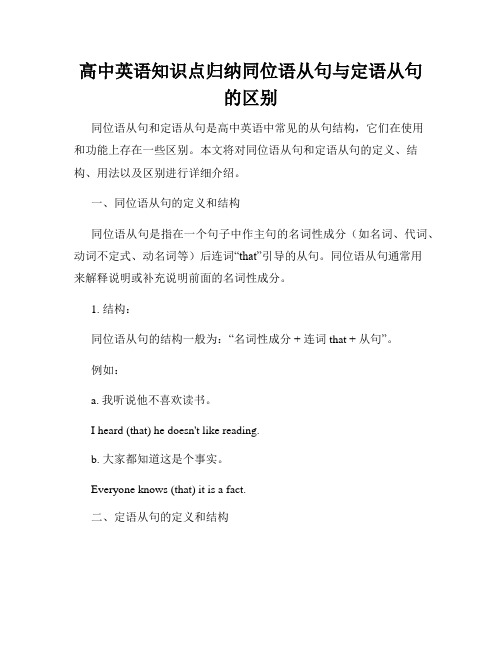
高中英语知识点归纳同位语从句与定语从句的区别同位语从句和定语从句是高中英语中常见的从句结构,它们在使用和功能上存在一些区别。
本文将对同位语从句和定语从句的定义、结构、用法以及区别进行详细介绍。
一、同位语从句的定义和结构同位语从句是指在一个句子中作主句的名词性成分(如名词、代词、动词不定式、动名词等)后连词“that”引导的从句。
同位语从句通常用来解释说明或补充说明前面的名词性成分。
1. 结构:同位语从句的结构一般为:“名词性成分 + 连词that + 从句”。
例如:a. 我听说他不喜欢读书。
I heard (that) he doesn't like reading.b. 大家都知道这是个事实。
Everyone knows (that) it is a fact.二、定语从句的定义和结构定语从句是指在一个句子中作主句的名词性成分(如名词、代词、动词不定式、动名词等)后,由关系词(如who,whom,whose,which等)引导的从句。
定语从句通常用来修饰或限定前面的名词。
1. 结构:定语从句的结构一般为:“名词性成分(先行词) + 关系词 + 从句”。
例如:a. 这是我喜欢的书。
This is the book (which/that) I like.b. 那个帮助我们的人是谁?Who is the person (who/whom) helps us?三、同位语从句和定语从句的用法比较虽然同位语从句和定语从句都是从句结构,但它们在用法上有一些区别。
1. 功能不同:同位语从句在句子中起补充说明或解释前面名词性成分的作用,相当于一个同位语;而定语从句的作用是修饰或限定前面的名词性成分。
2. 引导词不同:同位语从句通常由连词“that”引导,有时也可以省略;而定语从句由关系词(如who, whom, whose, which)引导。
3. 位置不同:同位语从句通常跟在名词性成分之后,并起到进一步解释、说明、补充前面名词性成分的作用;而定语从句一般跟在被修饰名词性成分之后,用来修饰或限定该名词性成分。
定语从句和同位语从句的例子
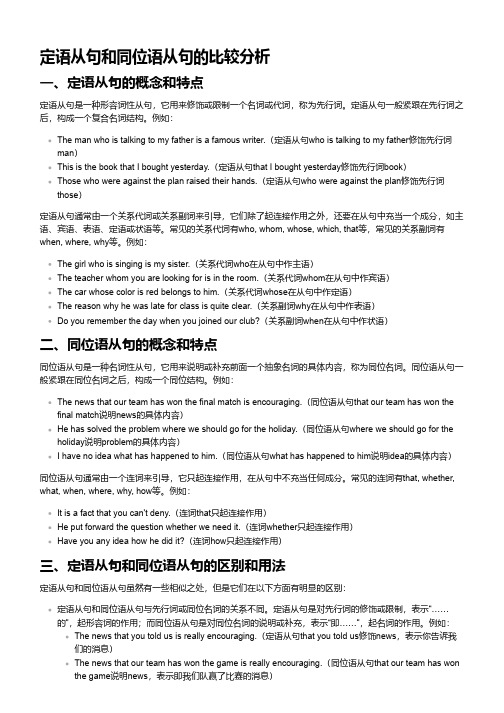
定语从句和同位语从句的比较分析一、定语从句的概念和特点定语从句是一种形容词性从句,它用来修饰或限制一个名词或代词,称为先行词。
定语从句一般紧跟在先行词之后,构成一个复合名词结构。
例如:The man who is talking to my father is a famous writer.(定语从句who is talking to my father修饰先行词man)This is the book that I bought yesterday.(定语从句that I bought yesterday修饰先行词book)Those who were against the plan raised their hands.(定语从句who were against the plan修饰先行词those)定语从句通常由一个关系代词或关系副词来引导,它们除了起连接作用之外,还要在从句中充当一个成分,如主语、宾语、表语、定语或状语等。
常见的关系代词有who, whom, whose, which, that等,常见的关系副词有when, where, why等。
例如:The girl who is singing is my sister.(关系代词who在从句中作主语)The teacher whom you are looking for is in the room.(关系代词whom在从句中作宾语)The car whose color is red belongs to him.(关系代词whose在从句中作定语)The reason why he was late for class is quite clear.(关系副词why在从句中作表语)Do you remember the day when you joined our club?(关系副词when在从句中作状语)二、同位语从句的概念和特点同位语从句是一种名词性从句,它用来说明或补充前面一个抽象名词的具体内容,称为同位名词。
- 1、下载文档前请自行甄别文档内容的完整性,平台不提供额外的编辑、内容补充、找答案等附加服务。
- 2、"仅部分预览"的文档,不可在线预览部分如存在完整性等问题,可反馈申请退款(可完整预览的文档不适用该条件!)。
- 3、如文档侵犯您的权益,请联系客服反馈,我们会尽快为您处理(人工客服工作时间:9:00-18:30)。
同位语从句与定语从句异同一. 同位语从句与定语从句的相似点1.同位语从句与定语从句都可以译成定语同位语从句:The news that our team has won the final match is encouraging.我们队取得决赛胜利的消息令人鼓舞。
定语从句:The news that you told us is really encouraging.你告诉我们的消息真的令人鼓舞。
2.同位语从句与定语从句都可以用that引导同位语从句:The suggestion that students should learn something practical is worth considering.学生应该学些实用的东西的建议值得考虑。
定语从句:The suggestion that is worth considering is that the students should learn something practical.值得考虑的建议是学生应该学些实用的东西。
3.同位语从句与定语从句和其它名词性从句一样也要用陈述语序同位语从句:Have you any idea where have they gone?(语序错误)Have you any idea where they have gone?你知道他们去哪里了吗?定语从句:Do you remember the day when did you join our club?(语序错误)Do you remember the day when you joined our club?你记得自己什么时候参加我们俱乐部的吗二.同位语从句的独特用法1.同位语从句有时也可以用whether来引导,但是定语从句则一般不用whether来引导。
例如: The problem (of) whether they could finish the project is very important.他们是否能够按期完成那个项目,这个问题非常重要。
2.某些名词后的同位语从句,其谓语动词应用虚拟语气形式:(should)+ 动词原形。
常见的名词有advice, suggestion, order, demand, proposal, request等。
例如:The advice that he (should) be invited to the party was taken.应该邀请他到晚会的建议被采纳了。
三.同位语从句与定语从句的区分方法1.从从句与先行词的关系区分同位语从句与定语从句从语义角度看,同位语从句与先行词之间存在的是同位或等同的关系,而定语从句与先行词之间存在的是所属关系,表示“……的”,起修饰限定作用。
例如:同位语从句:The news that she had passed the exam made her parents very happy.她考试及格的消息使她父母很高兴。
(that之后是news的具体内容)定语从句:The news that he told us interested all of us.他告诉我们的消息使大家都感兴趣。
(that之后是对news的解释)2.从引导词的作用区分同位语从句与定语从句从语法角度来看,引导同位语从句的that是连词,只起语法作用,用来连接同位语从句,在从句中不充当任何成分;而引导定语从句的that是关系代词,它除了起引导从句的语法作用之外,还要在从句中充当句子成分主要是作主语或宾语。
例如:同位语从句:The fact that he succeeded in the experiment pleased everybody.他实验成功这个事实使我们大家很高兴。
(that只起连接作用)定语从句:The fact that (which) we talked about is very important.我们所谈论的那个事实很重要。
(that在从句中作about的宾语)3.从先行词的词性区分同位语从句与定语从句从先行词的词性来看,同位语从句的先行词大都为抽象名词,而定语从句的先行词可以是名词,也可以是代词。
例如:同位语从句:There is no doubt that the price of wheat will go up.毫无疑问,小麦的价格将会上涨。
(doubt为抽象名词)定语从句:Those who were against the plan raised their hands.那些反对这个计划的人举起了手。
(Those为代词)4.从that可否省略区分同位语从句与定语从句从that可否省略来看,同位语从句的that一般不可以省略,但是定语从句中的关系代词如果在从句中充当宾语,在非正式用语中常常可以将关系代词that省略。
例如:同位语从句:We heard the news that our volleyball team had won the match.我们听说了我们排球队获胜的消息。
(that不可省略)定语从句:This is the very book (that) I’m looking for.这正是我要找的那本书。
(that作for的宾语,可以省略)5.从引导词与先行词的关系区分同位语从句与定语从句who, which, what, when, why, how, where等词都可以用来引导同位语从句,但它们的用法和用作关系代词或关系副词时引导定语从句的用法不同:引导同位语从句的关联词是对先行词的具体内容进行进一步的解释说明,与先行词不存在指代关系;而引导定语从句的关系代词或关系副词不但在从句中充当成分,而且与其修饰的先行词指代的是同一个人或者事物。
例如:同位语从句:He has solved the problem why the radio was out of order.他解决了收音机为何出故障的问题。
(why引导的是同位语从句)定语从句:The reason why he was late for class is quite clear.他上课迟到的原因显而易见。
(why引导的是定语从句)同位语从句/定语从句辨析小练一、指出同位语从句和定语从句,并翻译。
1. We are not looking into the question whether he is worth trusting.2. Word came that he had been abroad.3. The order that we received yesterday was that we should send a few people to help the other groups.4. I made a promise that if anyone set me free I would make him very rich.5. The mother made a promise that pleased all her children.二、单项选择1. It was true _____ Alice did surprised her mother.A. thatB. whatC. that, whatD. what, that2. Does ____matter much ____he can’t come to the meeting.A. it, ifB. that, ifC. it, whetherD. this, whether3.--What are you anxious about? -- ____A. How can we succeedB. Whether we can succeedC. When can we succeedD. That we can succeed4. The reason ____the little actress has been such a success is ____she is both clever and hard-working.A. why, whyB. why, thatC. that, becauseD. for, because5. ____leaves the room last ought to turn off the lights.A. WhoB. WhoeverC. AnyoneD. The person6. I really don’t know _____I had this photo taken.A. where it was thatB. it was thatC. where it wasD. it was why7. Dr. Black comes from either Oxford or Cambridge. I can’t remember ____.A. whereB. thereC. whichD. that8.--What do you think of China? --____different life is today from ____it used to be.A. How, whatB. What, whatC. How, thatD. What, that9. Give this to ____you think can do the work well.A. whoB. whomC. whoeverD. whomever10.____troubles me is ____I can’t learn all these En glish idioms by heart.A. That, thatB. What, whatC. That, whatD. What, that11. The fact ____ she works hard is well known to us all.A. thatB. whatC. whyD. which12. The news ____ he was kidnapped surprised us greatly.A. whatB. thatC. whyD. when13. His suggestion ____ the meeting be delayed was turned down.A. whichB. thatC./D. it14. I have no idea ____ he will start.A. whenB. thatC. what D ./15. He often asked me the question ____ the work was worth doing.A. whetherB. whereC. thatD. when1—5 CABBB 6—10 ACACD 1-15 ABBAA三、用适当的连接词填空:1. It worried her a bit _____ her hair was turning gray.2. I have no idea _____ we can do with these waste materials.3.____the doctor really doubts is____my mother will recover from the serious disease soon.4. It is hoped____nature will never be destroyed.5. ____do you guess will give a talk on English tomorrow?6.-- I drove to Zhuhai for the air show last week. -- Is that ____ you had a few days off?7. Word came____I was wanted at the office.8. Do you know ____of them will be our new headmaster?9. The teacher didn’t tell me ____we were wrong.10. It’s generally considered unwise to give a child ____he or she wants. ?1. that2. what3. what, whether4. that5. who6. why7. that8. which9. where 10. Whatever。
